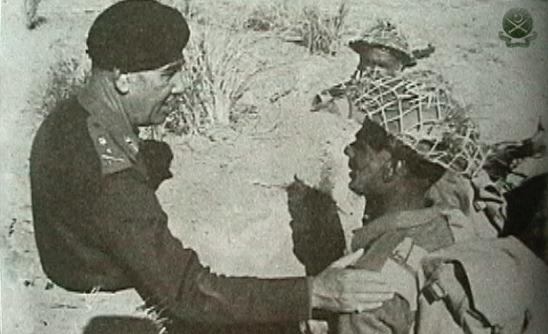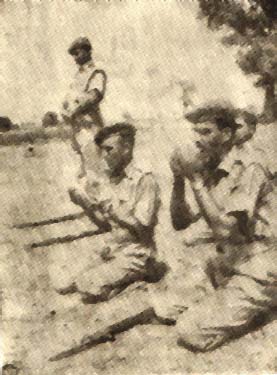|
|
|
On the early dawn of 6 September 1965, India launched a sneakish aggression on the Lahore front in West Pakistan and tried to cross the International Boundary. The Indian troops promised to take their midday meal at Lahore and the officers promised to bet up at Lahore Gymkhana. Thus on the early dawn of 6 September 1965, they overran the Rangers Wagah Post which was 17 miles from Lahore and entered Pakistan's territory without declaring any war. They made a three pronged frontal-attack on Wagah. Indians also attacked from the air on a passenger train at Wazirabad Railway Station.
This naked treacherous aggression of India compelled Pakistan to accept the challenge. On the same day at 11:00 a.m. the President of Pakistan in a broadcast said, "Now that the Indian rulers with their customary cowardice and hypocrisy, have ordered their armies to march in to Pakistan's territory, with out formal declaration of war, its time to give them a crushing reply."
The Pakistan Army did not take long in repulsing the Indian aggression. They fought with courage, determination, devotion and dedication. They were full of thrill and emotionally stirred up with the spirit of Jihad. They fought till the Indians were made to run back from the sacred territory of Pakistan. The war continued for seventeen days and during the time they cooled down the Indian military. During the whole war, Pakistani forces proved that quality matters more than quantity. They practically showed that although they were less in number, they were capable of facing the challenge of defending their motherland.

Unable to face the Pakistan Armed Forces and after continuous failure of Indian military, the Indian government knocked the doors of the United Nations and on 20 September 1965 the Security Council asked the governments of Pakistan and India to effect a ceasefire from 23 September 1965. On 25 February 1966, both forces withdrew to their pre-5 August 1965 positions after signing of Tashkent Declaration.
THE WAR IN THE EYES OF INTERNATIONAL MEDIA
One-fifth of an Indian division has been shattered in what has been the greatest tank battle since World War II. For it was here that India's attacking forces came to a dead stop. During the night they threw in every reinforcement they could find. But wave after wave of attacks were repulsed by the Pakistani troops. 'Daily Mirror', Correspondent, September 15, 1965.
India is claiming all-out victory. I have not been able to find any trace of it.
All I can see are troops, tanks and other war material rolling in a steady
stream towards the front. If the Indian Air Force is so victorious, why has it
not tried to halt this flow? The answer is that it has been knocked from the
skies by Pakistani planes. Roy Meloni, Correspondent of American Broadcasting
Corporation. September 15, 1965
It is clear from the fury with which the enemy (Pakistan) is fighting on all
fronts that it has not been easy for the Indian Army to advance in to Pakistan
territory. 'Times of India', Bombay, September 16, 1965.
Indian pilots are inferior to Pakistan's pilots and Indian officers' leadership
has been generally deplorable. India is being soundly beaten by a nation which
is outnumbered by a four and a half to one in population and three to one in
size of armed forces. 'Sunday Times', London, September 19, 1965.
Outnumbered three-to-one, they beat the Indians to a standstill, and were about
to mount a counter-attack in the last six hours before the cease-fire when they
were stopped on political grounds. Donald Seaman, 'Daily Express', London,
September 24, 1965.
Both encounters were typical of the way that the smaller Pakistani forces have
repeatedly stalled Indian thrusts. Frank Melville, 'Newsweek', September 27,
1965.
WAR DIARY
Seventeen days of continuous victory, Pakistan Army has left
a glorious history which will always be remembered and will continue to inspire the future generations.
Here are the battles which the Pakistani defenders fought with devotion and courage.

> Battle of Chawinda - Sialkot